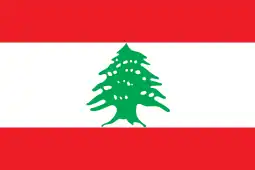Lebanese nationalism
Lebanese nationalism, a nationalistic ideology, considers the Lebanese people as a distinct nation independent from the Arab world. The ideology considers the Lebanese people to be direct descendants of the Phoenicians.



The Druzite and Maronite community in Lebanon played an important role in the formation of the modern state of Lebanon in the early 18th century, through a governing and social system known as the "Maronite-Druze dualism" in Mount Lebanon Mutasarrifate[1] This ideology is rooted in the 19th-century sectarian war between the Maronites and Druze that occurred in Mount Lebanon. It took its formalized form during the inter-war period and the French Mandate of Syria, when it served primarily as a tool in opposing Arab nationalism and in justifying the existence of the nascent country of Lebanon.
During the 20th century, especially during the Lebanese Civil War, Lebanese nationalism was associated with the Kataeb Party, Lebanese Forces, National Liberal Party and secularist movements like Guardians of the Cedars, National Bloc and the Lebanese Renewal Party, spearheaded by the renowned late Lebanese poet and philosopher Said Akl. It was also present among the Shiite Muslims of the Amal movement and a central ideology of its armed wing, the Lebanese Resistance Regiments.[2] Currently, it is present among the multi-confessional Lebanese Resistance Brigades subordinate to Hezbollah.[3] As a result, Lebanese nationalists have never formed a bloc, being very different ideologically and having divergent opinions on which allies to choose, all adding up to confessionalism.
Lebanese nationalism goes even further and incorporates irredentist views going beyond the Lebanese borders and seeks to unify all the lands of ancient Phoenicia around present-day Lebanon.[4] That comes from the fact that present-day Lebanon, the Mediterranean coast of Syria, and northern Israel is the area that roughly correspond to ancient Phoenicia and so most Lebanese people identify with the ancient Phoenician population of that region.[5] Therefore, the proposed Greater Lebanese country includes Lebanon, Mediterranean coast of Syria, and northern Israel.
The cultural and linguistic heritage of the Lebanese people is a blend of both indigenous elements and the foreign cultures that have come to rule the land and its people over the course of thousands of years. In a 2013 interview, the lead investigator, Pierre Zalloua, pointed out that genetic variation preceded religious variation and divisions: "Lebanon already had well-differentiated communities with their own genetic peculiarities, but not significant differences, and religions came as layers of paint on top. There is no distinct pattern that shows that one community carries significantly more Phoenician than another."[6]
See also
Notable Lebanese nationalists
- Youssef Bey Karam (1823–1889), Christian governor
- Elias Peter Hoayek (1843–1931), Maronite patriarch of Antioch
- Kahlil Gibran (1883-1931) writer, poet, and visual artist
- Camille Chamoun (1900–1987), president of Lebanon
- Pierre Gemayel (1905–1984), politician
- Said Akl, (1911–2014), poet, philosopher, writer, playwright, and language reformer
- Michel Aoun (1933–), President of Lebanon Free Patriotic Movement
- Dany Chamoun (1934–1990), politician
- Etienne Sakr (born 1937), nationalist leader
- Bachir Gemayel (1947–1982), president of Lebanon
References
- Deeb, Marius (2013). Syria, Iran, and Hezbollah: The Unholy Alliance and Its War on Lebanon. Hoover Press. ISBN 9780817916664.
the Maronites and the Druze, who founded Lebanon in the early eighteenth century.
- Norton, Augustus Richard (1987). Amal and the Shi'a: Struggle for the Soul of Lebanon. Austin: University of Texas Press. p. 39. ISBN 978-0292730403.
- "Christian, Sunni And Shia: Meet Hezbollah's Non-Denominational Military Branch Defending Lebanon, Fighting In Syria". International Business Times. 4 November 2015.
- Reviving Phoenicia: The Search for Identity in Lebanon By Asher Kaufman
- Kamal S. Salibi, "The Lebanese Identity" Journal of Contemporary History 6.1, Nationalism and Separatism (1971:76-86).
- Maroon, Habib (31 March 2013). "A geneticist with a unifying message". Nature. Retrieved 3 October 2013.
